Special Report
14 Times the Olympics Were Canceled, Boycotted, or Postponed
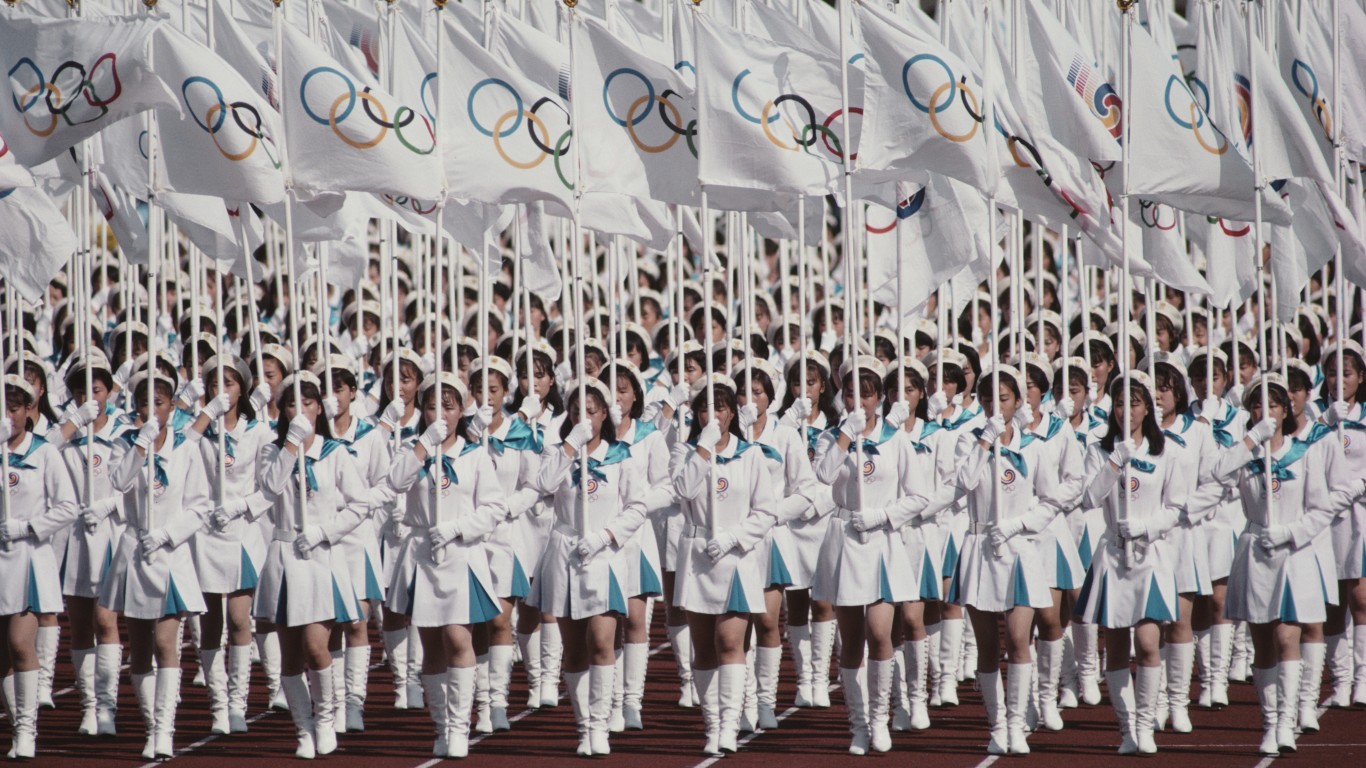
Published:

French aristocrat Baron Pierre de Coubertin was the visionary who dreamed of reviving the Olympic Games. He believed such an event should be global and that “all people must be allowed in, without debate.” His dream became reality in 1896 when the first modern Olympics were held in Greece, their ancient birthplace. (These are the locations of the last 31 summer Olympic Games.)
As an expression of universal brotherhood and sisterhood, few international events have suffused its participants with more genuine feelings of friendship and understanding. Yet not all of the Olympics held since 1896 have been free of controversy and conflict. (These are the countries with the most Winter Olympics gold medals.)
To compile a list of Olympics that were canceled, boycotted, or postponed, 24/7 Tempo reviewed a history of each modern Olympic Games from the database Olympedia. Diplomatic boycotts, in which a country declines to send political representatives but still allows athletes to compete, were not considered.
Five times in the 20th century, world wars caused cancellation of the Games. Some of these international events have been tainted by geopolitical grandstanding, too, leading to bans and boycotts with Cold War tensions as the backdrop.
Click here to learn about the 14 times the Olympics were cancelled, boycotted, or postponed
At other times, violence has scarred the Olympics, such as the terrorist attacks during the 1972 and 1996 Summer Olympics. And the advent of COVID-19 caused the postponement of the Tokyo Summer Olympics in 2020, the first such delay in Olympics history.
Although no nations are planning to boycott the Winter Olympics in Beijing in February, politics is still intervening. The United States and Australia are refusing to send diplomats to the opening ceremonies in protest over China’s human rights record, which includes its repression of the predominantly Muslim Uyghur minority and its suppression of political freedoms in Hong Kong.
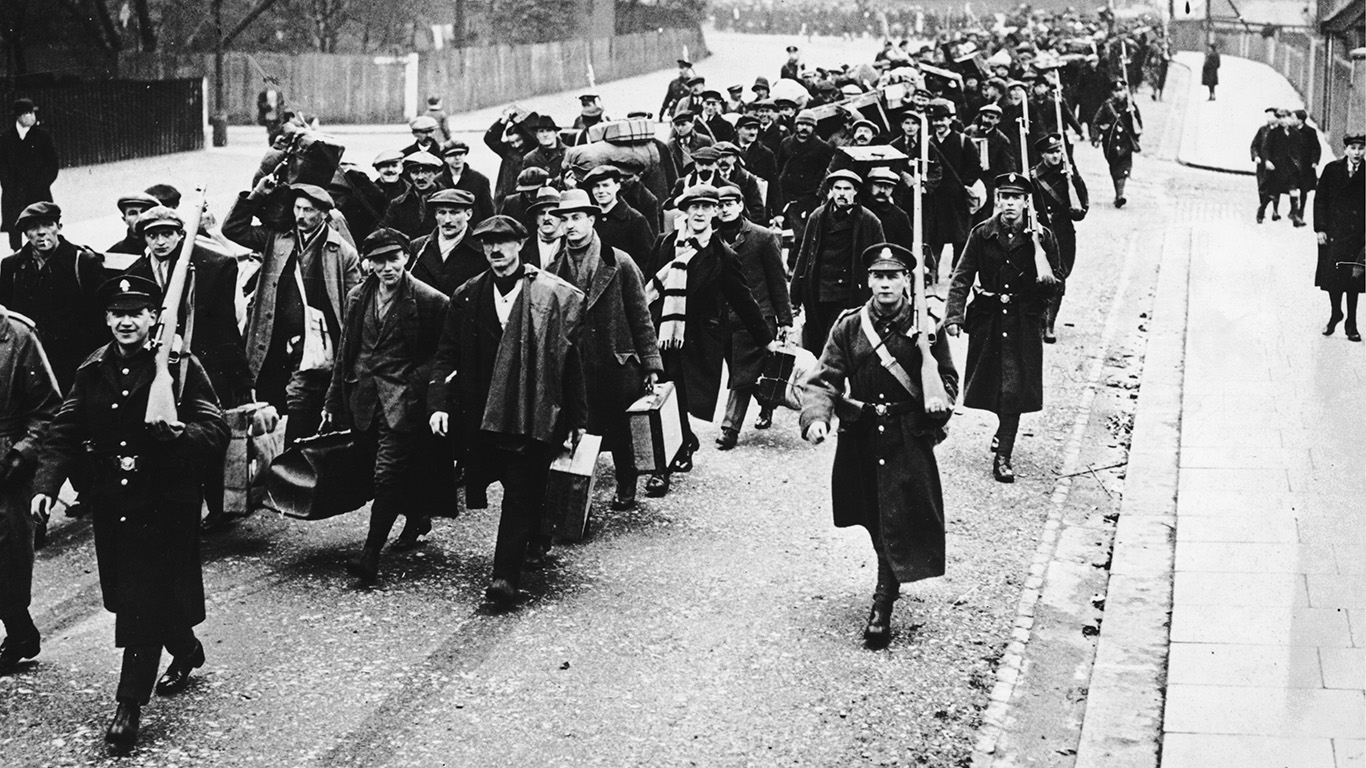
1916 Summer Games
> Disruption: Cancellation
> Reason: War
> Location: Berlin
The modern Olympic Games had only been held five times since their modern-day resurgence when the event was canceled in 1916 because of World War I, which had been raging for about two years at the time. The Summer Games that year (there were no Winter Olympics until 1924) were supposed to have been held in Berlin, the capital of Germany, one of the combatants in the war.
[in-text-ad]
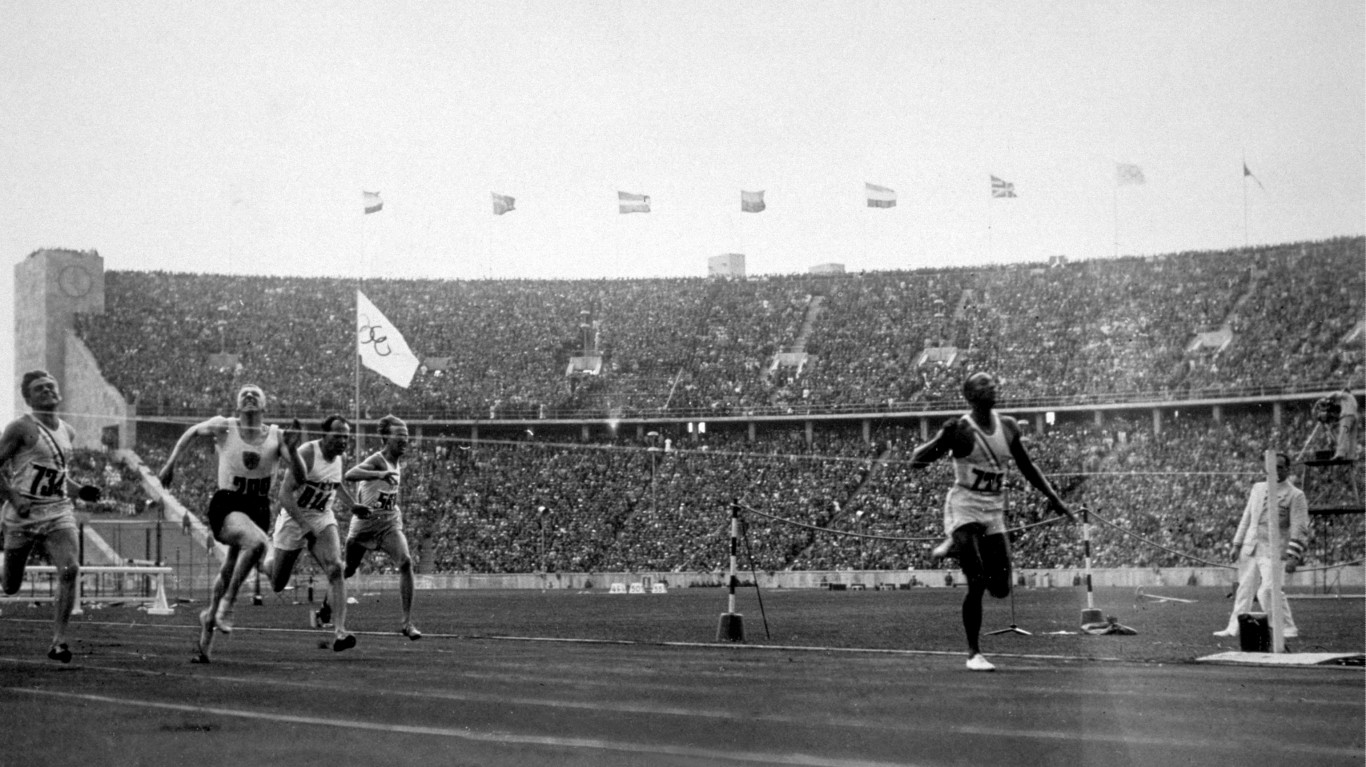
1936 Summer Games
> Disruption: Boycott
> Reason: Political
> Location: Berlin
Berlin was chosen as an Olympics venue in 1931, when the nation was a republic, and two years before the Nazis took power. The 1936 Summer Olympic Games were viewed by the Nazis as an opportunity to promote so-called Aryan superiority in sport.
By 1936, Germany’s anti-Semitic intentions were clear, and efforts to boycott the Games sprang up in Great Britain, France, Sweden, Czechoslovakia, and the Netherlands.
Various U.S. political figures and sports groups, including the American Athletic Union led by Jeremiah Mahoney, were against American participation. In the end, American Olympic Committee leader Avery Brundage opposed the boycott, saying politics had no place in sport. Some athletes who advocated a boycott backed a separate Olympics event in Spain, titled the “People’s Olympiad,” but that was canceled when the Spanish Civil War broke out shortly before it was to begin. Forty-nine nations attended the Berlin Olympics, the most up until that time. The Nazi fantasy of Aryan superiority suffered a blow when Jesse Owens, a Black American, won four gold medals – more than any other athlete at the games.

1940 Summer Games
> Disruption: Cancellation
> Reason: War
> Location: Tokyo; Helsinki
Tokyo was originally chosen to host the Games, at least in part as a diplomatic attempt to connect Japan with the international community after the country’s army invaded Manchuria. After the Second Sino-Japanese War began in 1937, however, the event was rescheduled for Helsinki. At that time, however, the Finnish nation was recovering from a brief but violent war with the Soviet Union and World War II had broken out in countries to the south of Finland, so the Games were canceled completely. In a curious footnote, prisoners of war in a camp near the German city of Nuremberg held their own “Olympics,” featuring athletes from Great Britain, France, Poland, Norway, and The Netherlands (and Helsinki hosted the games in 1952).
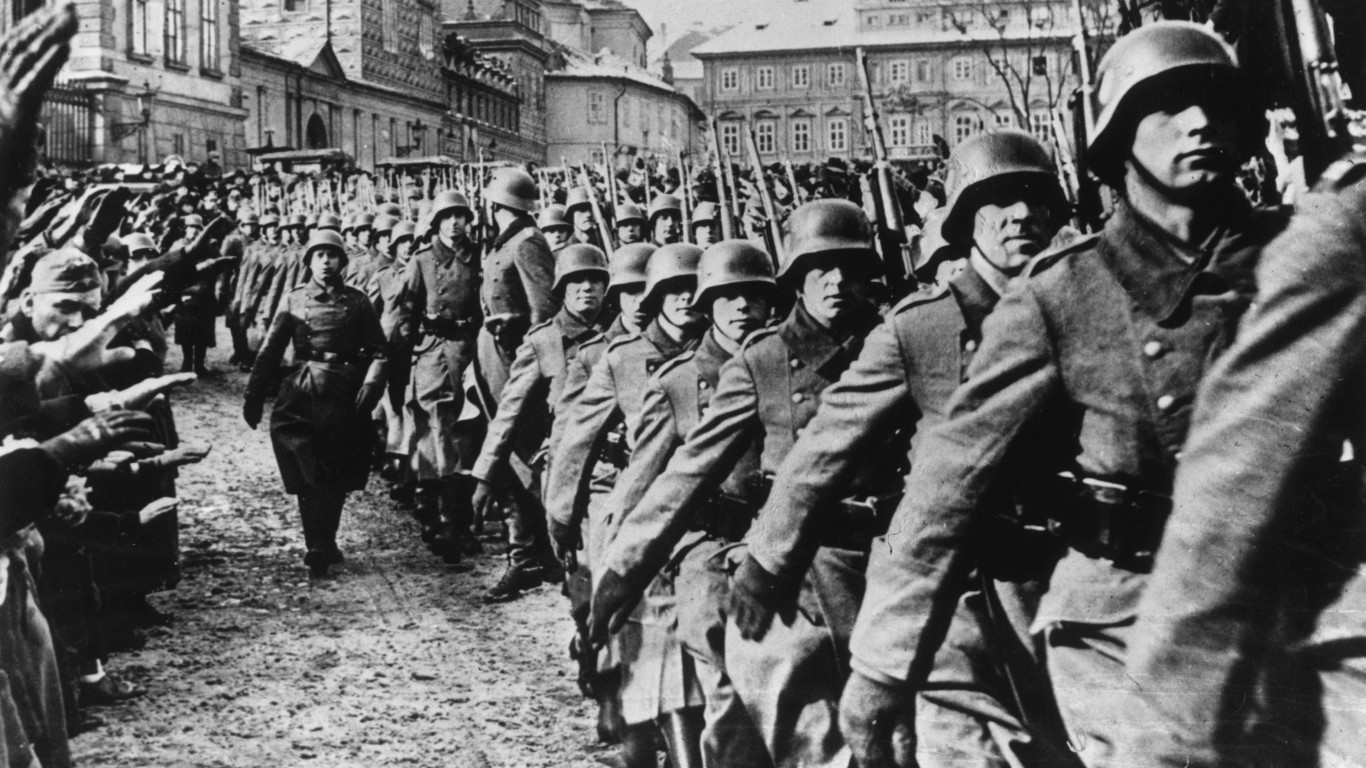
1940 Winter Games
> Disruption: Cancellation
> Reason: War
> Location: Sapporo, Japan; St. Moritz, Switzerland; Garmisch-Partenkirchen, Germany
The 1940 Winter Games had the unique distinction of being canceled not once but three times. They were originally scheduled to take place in Sapporo, the largest city on Hokkaido, the northernmost main Japanese island, but Japan bowed out in 1938, as the country was engaged in the Second Sino-Japanese War. The International Olympics Committee then awarded the Games to the Alpine town of St. Moritz, but withdrew the offer over a dispute about the professional status of ski instructors. Finally, the event was given to the picturesque German town of Garmisch-Partenkirchen, which had hosted them four years earlier. Just months before the Games were to begin, Germany invaded Poland, and as Europe devolved into World War II, the Winter Olympics were definitively canceled.
[in-text-ad-2]

1944 Summer Games
> Disruption: Cancellation
> Reason: War
> Location: London
With World War II raging, the 1944 Summer Olympic Games, scheduled to be held in London, were canceled. The UK capital had held the Summer Games in 1908 and would eventually host the Olympiad in 1948 and 2012.

1944 Winter Games
> Disruption: Cancellation
> Reason: War
> Location: Cortina d’Ampezzo, Italy
Scenic Cortina d’Ampezzo, Italy, in the southern part of the Alps, near the Austrian border, was due to be the location of the 1944 Winter Olympic Games. But with war raging in Italy, the event was canceled.
[in-text-ad]
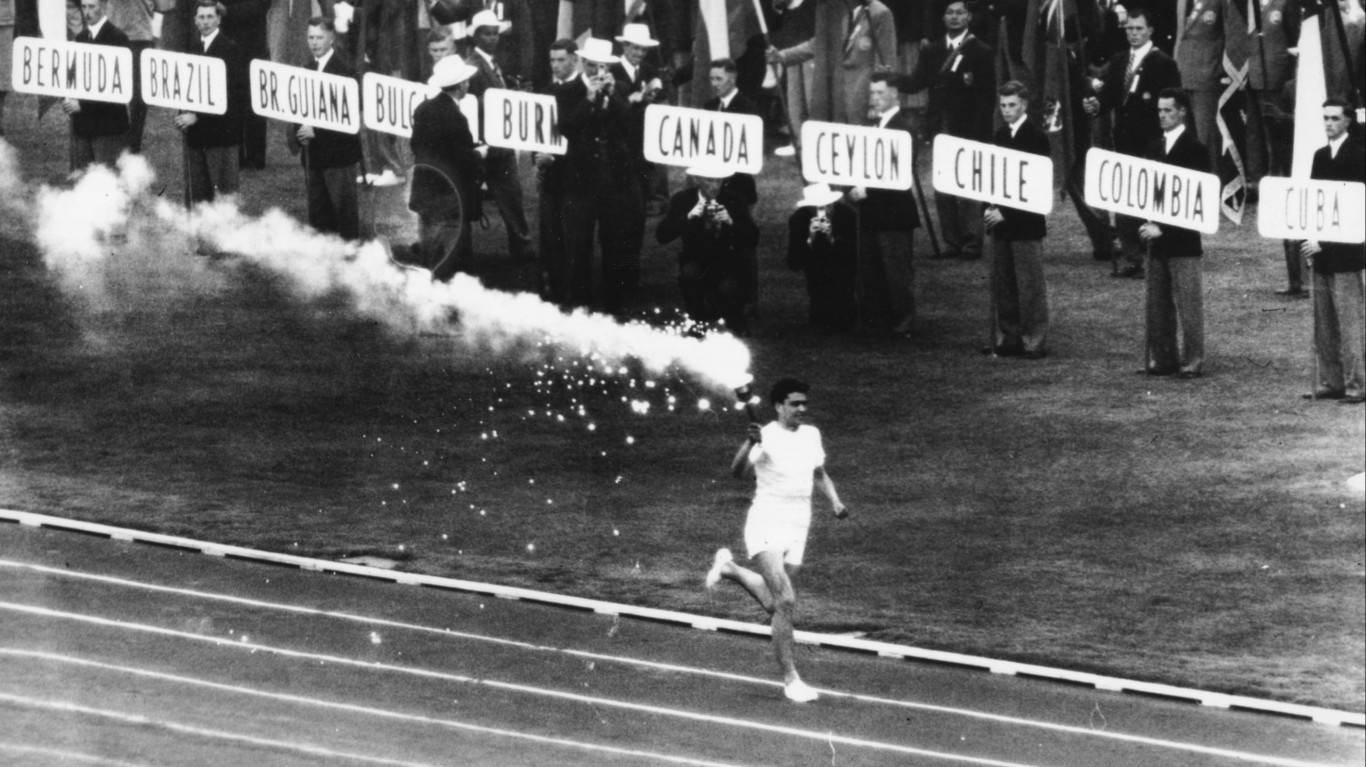
1956 Summer Games
> Disruption: Boycott
> Reason: Political
> Location: Melbourne, Australia
The 1956 Summer Olympic Games in Australia were the first Olympics held outside of Europe and the United States. The event was very contentious, with some nations boycotting it for a variety of reasons. A month before the Games began, the Netherlands, Spain, and Switzerland withdrew after Warsaw Pact troops led by the Soviet Union invaded Hungary to suppress the Hungarian Revolution. The People’s Republic of China pulled out because Taiwan, which China considered a breakaway province, was permitted to compete as a separate country. Egypt, Iraq, and Lebanon boycotted because of the Suez Canal Crisis, in which the British, French, and Israelis invaded Egypt and seized control of the waterway. All was not acrimony in Australia, however. At the closing ceremony, for the first time athletes marched together in solidarity, without national affiliation, a tradition that continues to this day.
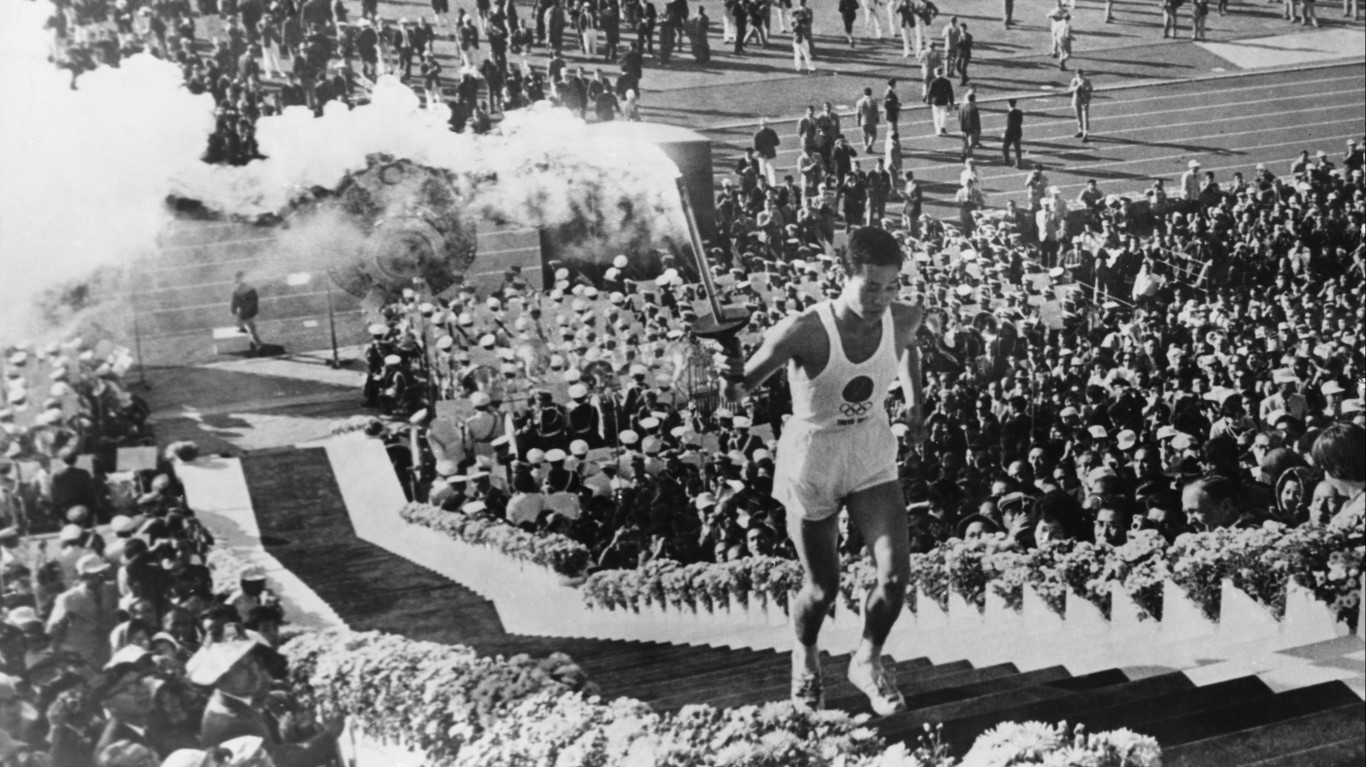
1964 Summer Games
> Disruption: Boycott
> Reason: Political
> Location: Tokyo
Politics reared its head in 1964 at the Tokyo Summer Olympics, the first held in an Asian nation – though Japan had been the original site of the canceled 1940 Summer and Winter Games. In 1963, Indonesia held what it called the Games of the New Emerging Forces, in which athletes from about 50 nations participated in Olympics-like events. The International Olympic Committee announced that it would ban any athletes who had been involved in the GANEFO from taking part in the 1964 Summer Games. As a result, Indonesia, China, and North Korea boycotted the Games. Also at the 1964 Olympics, South Africa was prohibited from participating for the first time because of its practice of apartheid. The ban lasted until 1992.
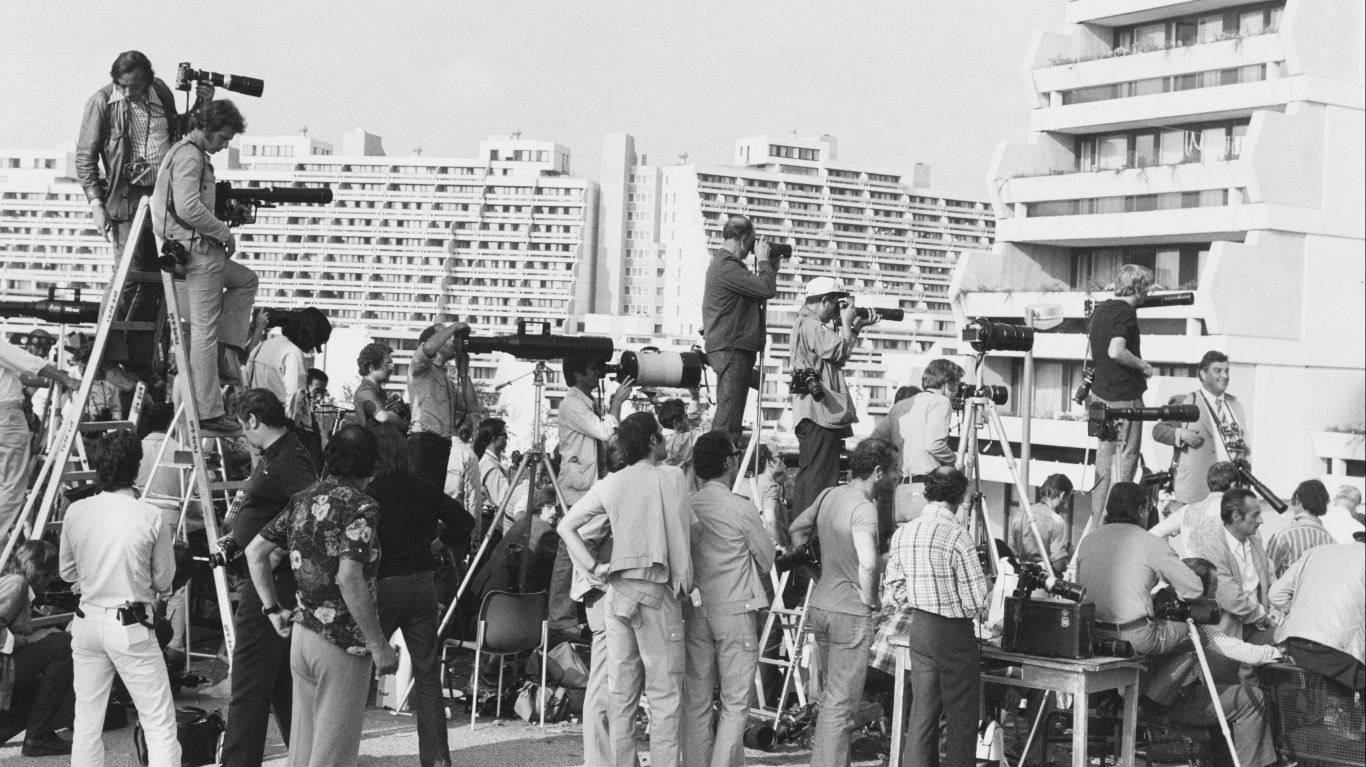
1972 Summer Games
> Disruption: Brief postponement
> Reason: Terrorism/Political
> Location: Munich
The 1972 Summer Olympic Games were the second Olympiad held in Germany, 36 years after the Games in Berlin under the Nazi regime in 1936. The West German government intended to frame the event as “the cheerful Games,” to draw a contrast with its predecessor. After the first week of competition, however, Palestinian terrorists stormed the Olympic village and took Israeli athletes and coaches as hostages. An attempt to rescue them failed, and 11 Israelis were killed, along with five terrorists and a West German policeman. Competition was suspended after the Palestinian attack, but the Games resumed after 36 hours.
[in-text-ad-2]
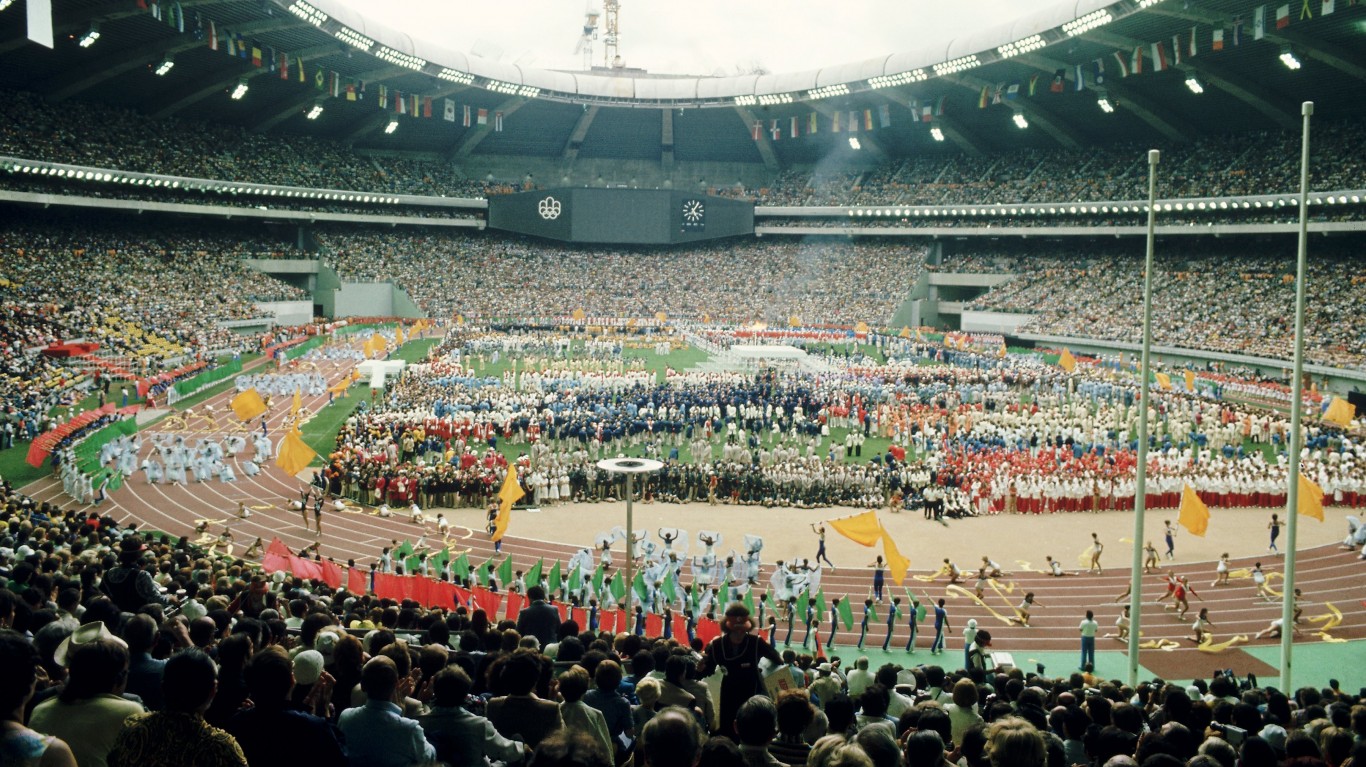
1976 Summer Games
> Disruption: Boycott
> Reason: Political
> Location: Montreal
Twenty-eight African nations boycotted the 1976 Summer Olympics in Montreal – the first time Canada hosted an Olympiad – because of the participation of New Zealand, whose national rugby team had flouted an international sports embargo against South Africa and its apartheid policies and toured that nation earlier in the year. Tanzania led the action, which involved more than 400 athletes. Separately, Taiwan withdrew from the Games when Canada refused to let its team compete as the Republic of China.

1980 Summer Games
> Disruption: Boycott
> Reason: Political
> Location: Moscow
After the Soviet Union invaded Afghanistan at the end of 1979, the U.S. led a boycott of more than 60 nations against the 1980 Summer Olympics in Moscow. The boycott included Canada, Israel, Japan, China, and West Germany, as well as many Islamic nations. A few countries allowed their athletes to compete, but not the United States – some of whose athletes unsuccessfully sued the US Olympic Committee in an effort to be allowed to participate. Only 80 countries competed in the 1980 Olympics, the fewest since 1956. The Soviet Union, with much of its competition absent, won 195 medals, which is still a record.
[in-text-ad]
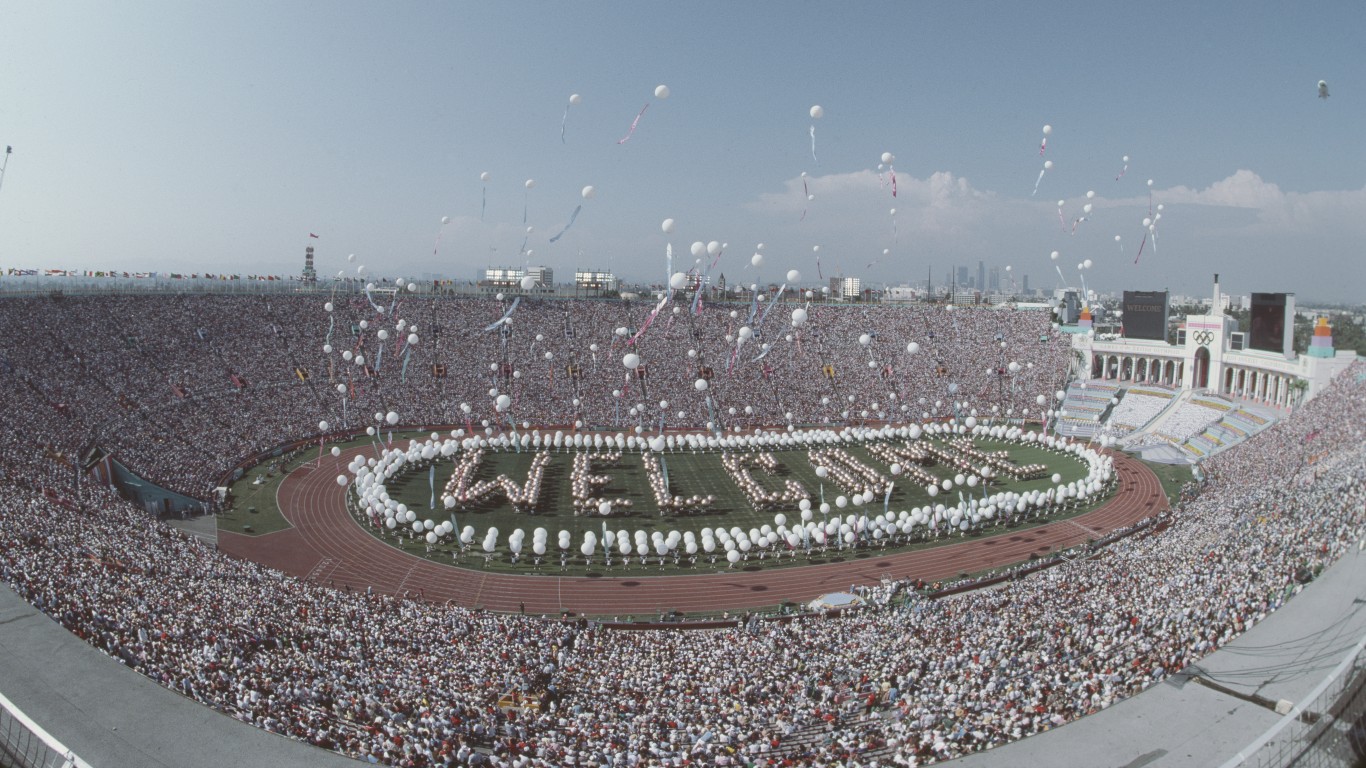
1984 Summer Games
> Disruption: Boycott
> Reason: Political
> Location: Los Angeles
In a reprisal for the multi-nation boycott of the previous Summer Olympics in Moscow, the Soviet Union and 13 other countries, mostly Eastern Bloc nations, boycotted the Olympics in Los Angeles. An official Soviet government statement said it feared physical attacks on its athletes and protests in the United States. The Games were nonetheless attended by 140 nations and were a resounding financial success. The event also was noteworthy for the return to the Olympics of China, which had not participated since 1952.

1988 Summer Games
> Disruption: Boycott
> Reason: Political
> Location: Seoul, Republic of Korea
The last Olympic Games of the Cold War era had their share of political machinations. North Korea, incensed over not being permitted to co-host the Summer Games with South Korea, refused to attend the event in Seoul. Cuba, Ethiopia, and Nicaragua joined North Korea in a gesture of socialist solidarity. The Soviet Union, however, chose to compete, as did China and the Eastern Bloc nations. The boycott did little to hurt the Games, which set a record for participation, with 159 nations sending athletes.
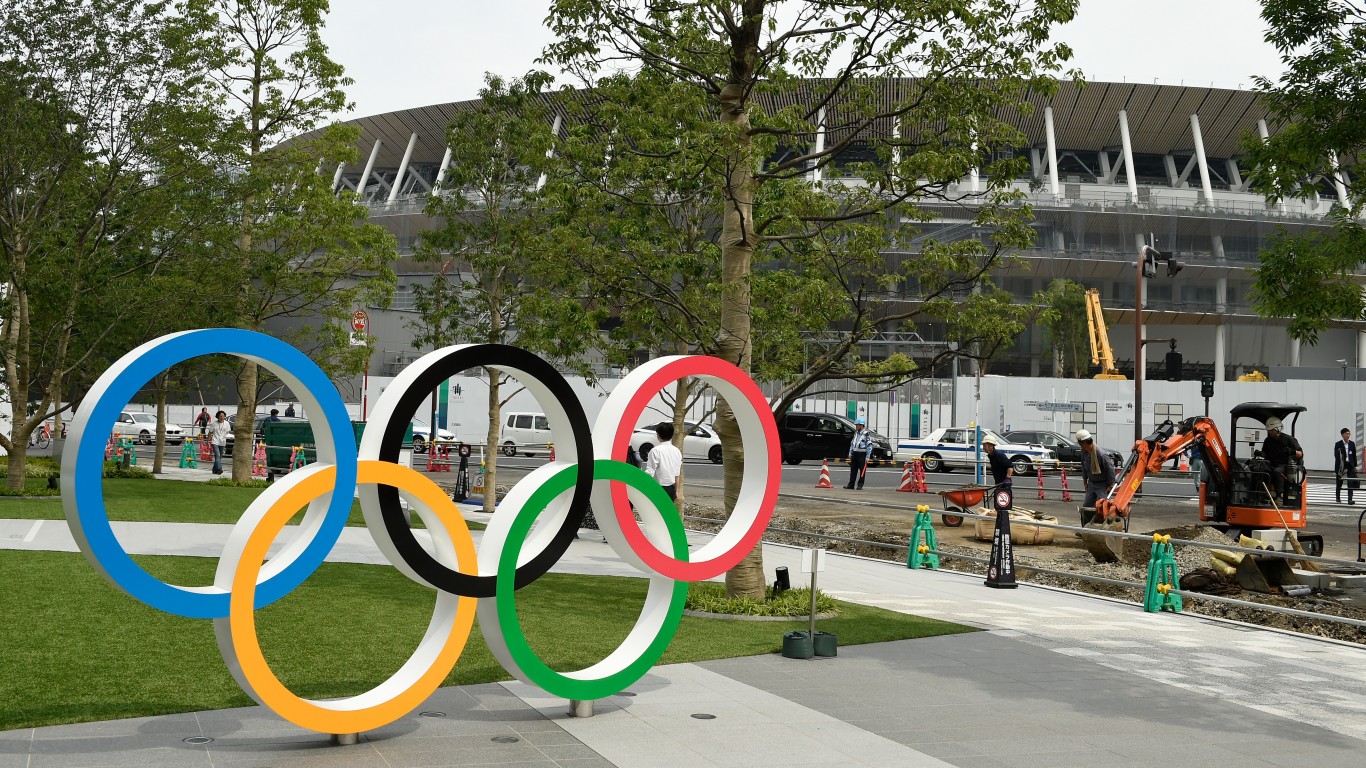
2020 Summer Games
> Disruption: Postponement
> Reason: COVID-19
> Location: Tokyo
The Summer Olympics were scheduled to return to Tokyo for the first time since 1964, but because of the pandemic, the Games were rescheduled to 2021. It was the first time the Olympic Games had been postponed, and the first time they were held in an odd year.
If you’re one of the over 4 Million Americans set to retire this year, you may want to pay attention.
Finding a financial advisor who puts your interest first can be the difference between a rich retirement and barely getting by, and today it’s easier than ever. SmartAsset’s free tool matches you with up to three fiduciary financial advisors that serve your area in minutes. Each advisor has been carefully vetted, and must act in your best interests. Start your search now.
Don’t waste another minute; get started right here and help your retirement dreams become a retirement reality.
Thank you for reading! Have some feedback for us?
Contact the 24/7 Wall St. editorial team.